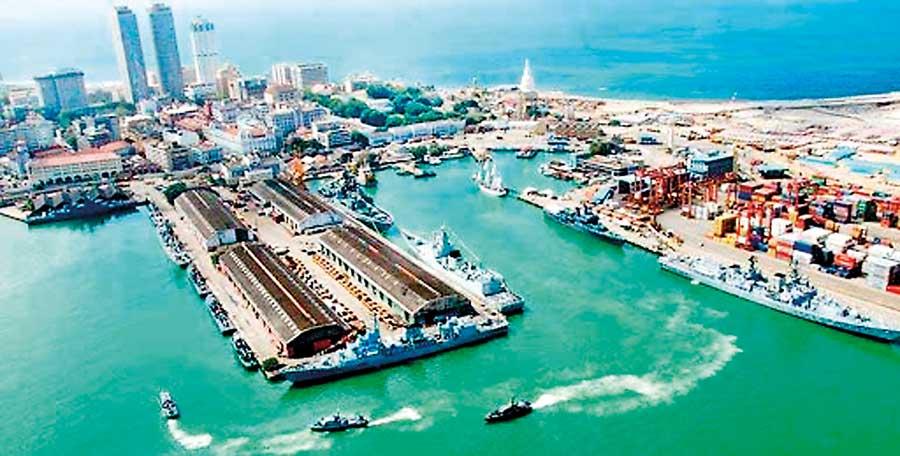Reply To:
Name - Reply Comment
Last Updated : 2024-04-26 08:21:00

The resolution of the East Container Terminal saga with a Cabinet decision that the Sri Lanka Ports Authority would retain 100% ownership and control, was widely seen as a victory for nationalist forces in general and the port trade unions in particular. Events that followed however raise doubts as to whether this was but a pyrrhic victory.
retain 100% ownership and control, was widely seen as a victory for nationalist forces in general and the port trade unions in particular. Events that followed however raise doubts as to whether this was but a pyrrhic victory.
Prospective stakeholders of the East Container Terminal (ECT) project, India and Japan, both made their displeasure known. Apparently by way of compensation for the snub, the government announced its intention to develop and operate the West Container Terminal (WCT) with “government of India and government of Japan nominated parties” along with the Ports Authority (SLPA), as a public-private partnership (PPP). This came as a surprise to many. Indian officials said they had no formal intimation of the move. Delhi was still simmering, and the Indian deputy high commissioner held meetings with Tamil and Muslim political leaders, with the now-familiar incantation of India’s position on devolution and the 13A - a thorny issue in Sri Lanka which tends to be revived periodically by Delhi at psychological moments. Indian PM Modi in Chennai on Sunday waxed eloquent on India’s concerns for the “welfare and aspirations of our Tamil brothers and sisters in Sri Lanka”. The timing of these remarks makes it abundantly clear that these issues are being used as strategic tools, if not weapons, to achieve India’s geopolitical objectives in the region.
But on Friday (12), Indian External Affairs spokesman Anurag Srivastava thought fit to announce that “India’s interest for participation in the Colombo port is a long-standing one.” Delhi possibly recalled what happened when India was given first call, but declined, to build Hambantota Port back then, thereby handing a walk-over to China. India will in all likelihood accept the WCT offer before it stirs up its own share of controversy once the details are made known.
ECT dilemma
The government’s shot-gun solution to the ECT dilemma -- by offering the WCT as a trade off to the foreign investors -- raises some troubling questions about decision making in relation to strategic assets. The trade union agitation brought to light the questionable mention in a cabinet paper of Indian Adani Group, bypassing any bidding process, despite its unsavoury track record as an investor both in India and abroad. Whether Adani, said to be ‘close’ to PM Modi, will make a comeback as the Indian stakeholder in the West Terminal, is unknown.
Announcing the government decisions relating the ECT and WCT, Energy Minister and co-cabinet spokesman Udaya Gammanpila made the astounding remark that the West Terminal had ‘no strategic value.’ (“batahira paryanthayata upaayamargika watinaakamak ne”). The ECT, WCT and CICT (Colombo International Container Terminal) are all part of the Colombo Port Expansion Project. All three share the same harbour basin and have a deep draft of 18 metres, unmatched by other ports in the region. The WCT which will be the largest -- is yet to be built, but it does not require any special insight to see its great value, both strategic and commercial.
LNG terminal for WCT
Media reports also revealed that the WCT will have an LNG (Liquified Natural Gas) terminal with two Floating Storage and Regasification Units (FSRUs). (‘West Container Terminal to be developed under joint venture’ – newsfirst.lk 10.02.21) The proposed LNG facilities in the WCT introduce an altogether new dimension to the investment. It is not clear who will fund them. But we do know that a proposed project to build an LNG terminal and FSRU was included, among a slew of other projects (including a 500MW gas fired power plant and a container terminal in Colombo Port) in an MoU between Sri Lanka and India signed in April 2017 during a visit to Delhi by then Prime Minister Ranil Wickremesinghe.
"Delhi was still simmering, and the Indian deputy high commissioner held meetings with Tamil and Muslim political leaders, with the now-familiar incantation of India’s position on devolution and the 13A - a thorny issue in Sri Lanka which tends to be revived periodically by Delhi at psychological moments"
Since an investment in an LNG terminal requires port facilities, any such project immediately takes on a strategic dimension. With foreign companies owned or backed by big powers becoming parties to these joint ventures or PPPs, such investments would require careful assessment specifically in relation to their geopolitical fallout. There does not seem to be any mechanism in place at this point to ensure that such evaluation takes place, in order to protect the national interest, and manage foreign relations in a manner that does not put Non-alignment in jeopardy. The ham-handed handling of the ECT affair could partly be attributed to this gap.
The energy sector appears to have opened up high stakes investment opportunities with the President’s declared aim of increasing the renewable energy component to 70% of the total electricity demand by 2030 with natural gas coming into the mix.
Enter the US
It is against this backdrop that the United States is making a bid to enter Sri Lanka’s energy sector. In September last year US ambassador Alaina Teplitz met Power Minister Dulles Alahaperuma and had a “long discussion on the future plans and development strategies of the power sector” according to the ministry website. The Sunday Times reported that a cabinet paper had been submitted before the August general election, with a US proposal for ‘an LNG solution’ to meet the country’s emergency power requirement. Alahaperuma said Teplitz had “expressed the interest of the Government of the United States of America in promoting this project that offers power at US$ 0.099 [Rs 18.29] per kilowatt hour…for a period of five (5) years.” Unsolicited proposals had been submitted by two private US companies in this regard. (‘Govt. gearing for US entry into power sector’– Sunday Times 15.11.20)
While the CEB is known to pay high rates per unit of electricity purchased from the private sector for ‘emergency power purchasing,’ it is unlikely that the US interest in the project lies in profit. Given the superpower’s intense geopolitical focus on Sri Lanka, a more credible explanation would lie in anticipated access to the Colombo Port, with an LNG terminal. At a recent media briefing with selected journalists the ambassador had reportedly made it a point to refer to the US proposals for ‘cooperation’ in the energy sector. She is also reported to have remarked on the need to involve an Indian company in the development of the ECT. The explanation for her unsolicited advice would perhaps lie in India’s status as a ‘major defence partner’ of the US, aligned with the super power in its ‘free and open Indo Pacific’ project to counter China.
When a tripartite venture with India and Japan to build an LNG terminal in Colombo Port was proposed in 2017 following the April 2017 MoU with India, PTI described the project as “the first collaboration between the two to counter China’s growing influence in the Island nation”. It was no longer possible to disentangle infrastructure development from geopolitics, this writer observed at the time (India eyes a stake in Colombo Port in addition to Trinco - Daily Mirror 12.06.17).
Has Sri Lanka’s energy sector become a new theatre of big power rivalry? Since the ECT and WCT are part of the same harbour expansion project, it would be a mistake to assume that the controversy has ended. The hurriedly proposed plan for the WCT presents a new set of worries. The ECT experience would seem to show that when foreign investments in high stakes energy projects are being evaluated, a more transparent and far-sighted approach is needed, with potential threats to sovereignty factored in alongside the commercial considerations.

Add comment
Comments will be edited (grammar, spelling and slang) and authorized at the discretion of Daily Mirror online. The website also has the right not to publish selected comments.
Reply To:
Name - Reply Comment
US authorities are currently reviewing the manifest of every cargo aboard MV
On March 26, a couple arriving from Thailand was arrested with 88 live animal
According to villagers from Naula-Moragolla out of 105 families 80 can afford
Is the situation in Sri Lanka so grim that locals harbour hope that they coul